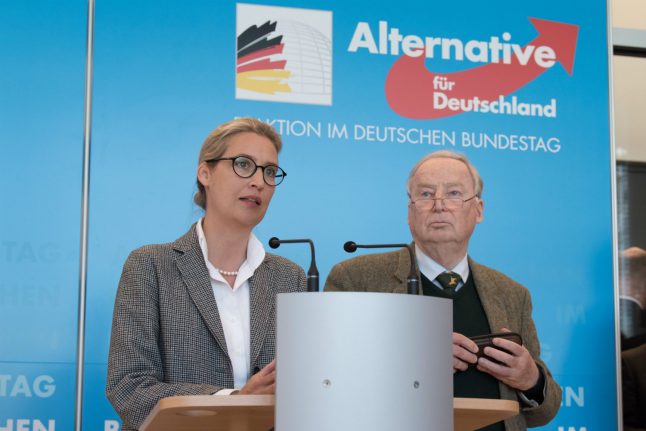A survey published on Sunday by the German weekly Bild am Sonntag found the far-right party’s support has fallen to 12 per cent, its worst rating since March 2018.
It follows a drop in popularity at the start of the year, when the party polled at 13 percent in a Bild opinion poll. Surveys since then have shown a similar trend.
SEE ALSO: AfD drops in popularity, Greens and Christian Democrats on the up
The survey paints a contrasting picture to September 2018 when a ‘Deutschlandtrend' survey published by German broadcaster ARD put the AfD at 18 percent. That made them the second strongest party in Germany after the Union.
The newest poll involved asking 2,355 respondents who they'd vote for if national elections were coming up. It was conducted between March 28th and April 3rd.
It came as the AfD, known for its anti-immigration stance, continued to battle a series of controversies.
As The Local reported last week, an investigation claimed that AfD member of parliament Markus Frohnmaier, who is based in Baden-Württemberg, could act as a puppet for Russia.
The BBC conducted the joint investigation into Russian documents together with German magazine Der Spiegel, German TV channel ZDF and the Italian newspaper La Repubblica.
The documents dating from 2017 indicate that close allies of Russian President Vladimir Putin believed that Frohnmaier, who was elected to the Bundestag Lower house in September that year, was very partial to their strategic interests.
Frohnmaier told the BBC he was not aware of the documents.
SEE ALSO: German AfD MP could be 'absolutely controlled' by Russia
At the weekend, Jörg Meuthen, the AfD's lead candidate for the European Parliament elections, which take place next month, dismissed allegations against his party as conspiracy theories and insisted it has “many good allies” in other European countries.
The party has come under scrutiny recently after it was discovered its co-leader Alice Weidel received more than €130,000 from Switzerland ahead of the 2017 national election — a possible breach of German electoral law.
Meuthen also came under fire over free election ads he and others in the party received from a Swiss-based PR agency.
SEE ALSO: Far-right parties kick off campaigns for Europe election
CDU and SPD gain
Meanwhile, the Bild am Sonntag poll showed support for the centre-right Christian Democrats (CDU), its Bavarian sister party Christian Socialists (CSU), and the centre-left Social Democrats (SPD) had risen slightly.
The CDU/CSU parties increased by one point to 31 percent. The SPD also gained one percentage point to achieve 17 percent. But is still one point behind the Greens (18 percent), who are the second most popular party in Germany, according to the survey
According to the survey, the Left Party (Die Linke) remained stable at 9 percent, while the pro-business Free Democrats (FDP) dropped slightly to 8 percent.




 Please whitelist us to continue reading.
Please whitelist us to continue reading.
Member comments